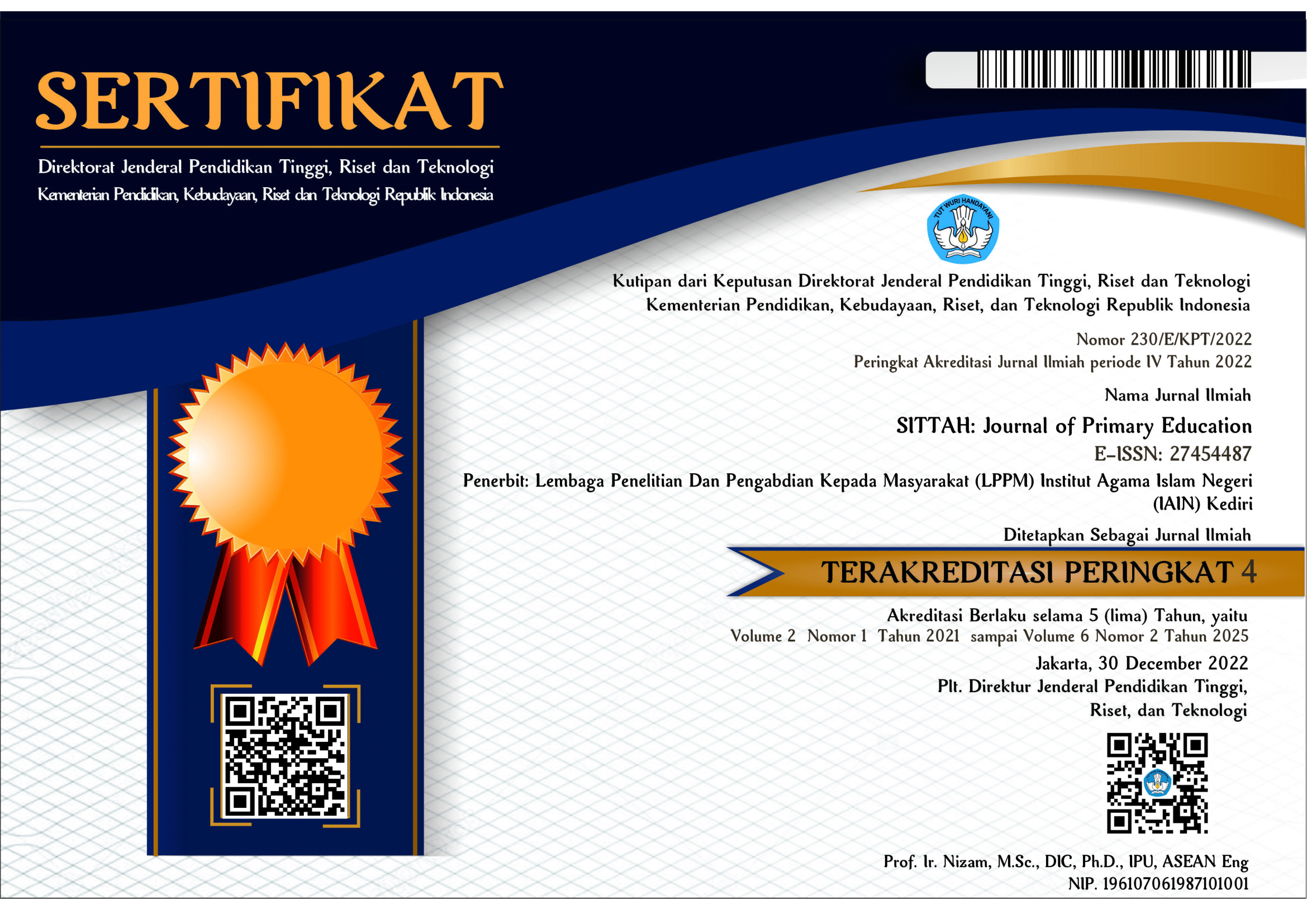PROFESIONALITAS GURU SEKOLAH DASAR ATAS HUKUMAN DAN HADIAH: STUDI KASUS DI SEKOLAH DASAR NEGERI
DOI:
https://doi.org/10.30762/sittah.v4i1.953Keywords:
Public Elementary School, Reward and Punishment, Teacher ProfessionalismAbstract
The purpose of this study was to analyze the views of public elementary school (SDN) teachers on punishment and rewards within the framework of teacher professionalism. The research method used is qualitative, with two data collection techniques: interviews with research subjects and direct observation. This study found that teachers have a constructive view of reward and punishment. With this constructive view, giving gifts and punishments has improved student behavior. The technique of giving punishments and rewards is carried out democratically, namely by providing socialization to students and involving students' commitment to agreeing on the rules that have been socialized. The punishment given to students was giving advice, saluting the flag, throwing trash in its place, sweeping and cleaning the classroom, memorizing Pancasila, singing the national anthem Indonesia Raya, and cleaning the toilets. In contrast, reward giving is praise, a book, cash, food, and high marks.
Downloads
References
Abidin, Z., Romadhona, G., Andini, V. Y., & Faiz, M. (2021). Implementasi Reward Dan Punishment Terhadap Peningkatan Kosa Kata Bahasa Inggris Di Bintana Research And Literacy Shelter Indonesia. Fenomena, 20(2), 233–248. https://doi.org/10.35719/fenomena.v20i2.62
Anggraini, S., Siswanto, J., & Sukamto, S. (2019). Analisis Dampak Pemberian Reward And Punishment Bagi Siswa SD Negeri Kaliwiru Semarang. MIMBAR PGSD Undiksha, 7(3). https://doi.org/10.23887/jjpgsd.v7i3.19393
Aypay, A. (2018). Predictive Relationships among Reward Addiction—Punishment Sensitivity and Reward Addiction—School Burnout in Middle School. Egitim Ve Bilim-Education And Science, 43(194). https://doi.org/10.15390/eb.2018.6909
Bayraktar, H. V., & Dogan, M. C. (2017). Investigation of Primary School Teachers’ Perception of Discipline Types They Use for Classroom Management. Higher Education Studies, 7(1), p30. https://doi.org/10.5539/hes.v7n1p30
Daheri, M., Nurhidin, E., & Warsah, I. (2022). Kompetensi Guru Profesional: Potret Perjuangan Pendidikan Islam Syekh Jalaludin. An-Nawa: Jurnal Studi Islam, 4(2), Article 2. https://doi.org/10.37758/annawa.v4i2.522
Daheri, M., Pattiasina, P. J., Saputra, N., Nurdiansyah, N. M., & Uzlifah, L. (2022). Pengaruh Reward Dan Punishment Terhadap Profesionalisme Guru. Munaddhomah: Jurnal Manajemen Pendidikan Islam, 3(4), 388–397. https://doi.org/10.31538/munaddhomah.v3i4.304
Dolan, E. L., Elliott, S. L., Henderson, C., Curran-Everett, D., St. John, K., & Ortiz, P. A. (2018). Evaluating Discipline-Based Education Research for Promotion and Tenure. Innovative Higher Education, 43(1), 31–39. https://doi.org/10.1007/s10755-017-9406-y
Heilmann, A., Mehay, A., Watt, R. G., Kelly, Y., Durrant, J. E., van Turnhout, J., & Gershoff, E. T. (2021). Physical punishment and child outcomes: A narrative review of prospective studies. The Lancet, 398(10297), 355–364. https://doi.org/10.1016/S0140-6736(21)00582-1
Hutagaol, A. L., Wardah, S. R. R., & Neliwati, N. (2022). Upaya Meningkatkan Kinerja Guru Melalui Reward dan Punishment di Madrasah. Edukatif : Jurnal Ilmu Pendidikan, 4(1), 1281–1288. https://doi.org/10.31004/edukatif.v4i1.2159
Khumaidi, M. W. (2020). Pemberian Hukuman Dalam Perspektif Pendidikan Islam: Hukuman dalam Perspektif Pendidikan Islam. An Naba, 3(2), 134–149. https://doi.org/10.51614/annaba.v3i2.61
Khurshid, K., Batool, U., & Hussain, B. (2020). Perceptions of Teachers Regarding Corporal Punishment and Its Effects on Students’ Achievement at Primary School Level. Journal of Elementary Education, 30(1), 27–38. http://111.68.103.26/journals/index.php/jee/article/view/2667.
Linn, N., Kallawicha, K., & Chuemchit, M. (2022). The use of corporal punishment against children in Myanmar: An analysis of data from the 2015–2016 Myanmar Demographic and Health Survey. Child Abuse & Neglect, 131, 105692. https://doi.org/10.1016/j.chiabu.2022.105692
Mamnun, M., & Iswara, P. D. (2021). How is The Application of Effective Punishment to Improve Achievement of Elementary School Students During the Covid-19 Pandemics? International Conference on Elementary Education, 3(1), 24–30. http://proceedings.upi.edu/index.php/icee/article/view/1438.
Munte, A. (2018). Era of Disruptions, Gender and Contributions of New Testament (NT) in Christian Religion. Ushuluddin International Conference (USICON), 2. https://conference.uin-suka.ac.id/index.php/USICON/article/view/387
Peguero, A. A., Varela, K. S., Marchbanks, M. P. “Trey,” Blake, J., & Eason, J. M. (2021). School Punishment and Education: Racial/Ethnic Disparities With Grade Retention and the Role of Urbanicity. Urban Education, 56(2), 228–260. https://doi.org/10.1177/0042085918801433
Rizqiyah, N., & Lestari, T. (2021). Pengaruh Metode Reward dan Punishment Terhadap Perkembangan Moral Siswa Sekolah Dasar. Edumaspul: Jurnal Pendidikan, 5(2), 242–249. https://doi.org/10.33487/edumaspul.v5i2.1361
Safitri, M. L. O., Mustadi, A., & Retnawati, H. (2021). The Role of Teachers in Implementation Social Care Education Character at Primary Schools. Jurnal Iqra’ : Kajian Ilmu Pendidikan, 6(2), 39–50. https://doi.org/10.25217/ji.v6i2.1315
Sanasintani. (2018). The Teacher’s Response to the Supervision Approach of Supervisors with Cultural Insights: Huma Betang Cantik City, Central Kalimantan, Indonesia. 150–156. https://www.atlantis-press.com/proceedings/icet-18/125926637
Simanjorang, G., Berliani, T., & Nugroho, Pi. J. (2020). Pembinaan Etos Kerja Guru Di Smas Golden Christian School Palangka Raya. Equity In Education Journal, 2(1), Article 1. https://doi.org/10.37304/eej.v2i1.1683
Sultana, S., Reza, H., & Bromfield, N. F. (2019). The Relation Between Socioeconomic Characteristics and the Use of Physical Punishment in Bangladeshi Elementary Schools. Child & Youth Services, 40(3), 308–327. https://doi.org/10.1080/0145935X.2019.1604133
Syawaludin, A., & Marmoah, S. (2018). Reward and punishment in the perspective of behaviorism learning theory and its implementation in elementary school. Social, Humanities, and Educational Studies (SHES): Conference Series, 1(1). https://doi.org/10.20961/shes.v1i1.23614
Syuhada, S. (2022). The Influence of Principal Leadership, Rewards and Punishment from Principals on Teacher Discipline in Elementary Schools. Journal of Educational Sciences, 6(1), Article 1. https://doi.org/10.31258/jes.6.1.p.128-142
Toropova, A., Myrberg, E., & Johansson, S. (2021). Teacher job satisfaction: The importance of school working conditions and teacher characteristics. Educational Review, 73(1), 71–97. https://doi.org/10.1080/00131911.2019.1705247
Widaningsih, E. (2012). Pembelajaran Seni Budaya Dan Keterampilan Menumbuhkan Kecerdasan Moral Secara Kompetitif. EduHumaniora: Jurnal Pendidikan Dasar Kampus Cibiru, 4(2), Article 2. https://doi.org/10.17509/eh.v4i2.2826
Wirawan, A. (2021). Pendidikan Kristen Dalam Keluarga Sebagai Pendekatan Pembentukan Karakter Anak. Harati: Jurnal Pendidikan Kristen, 1(1), 18–33. https://doi.org/10.54170/harati.v1i1.29
Downloads
Published
How to Cite
Issue
Section
License
Copyright (c) 2023 Elvita Erika, Lukas Lukas, Puspita Dewi Debi, Yuhandra Conli Kosdamika, Rijaya Rijaya

This work is licensed under a Creative Commons Attribution-NonCommercial-ShareAlike 4.0 International License.











